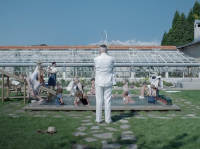
In this nearabout sequel to Haneke’s The White Ribbon, Christian Friedel nonchalantly acts out a possible trajectory centred on his Ribbon character’s destiny, which teased the supposition of its village’s children as fated Hitler Youth. Aesthetically, Zone is the Jeanne Dielman of SS films, though scrutinised under the bewitchment of Kubrick’s icy detachment (see the ballroom scene where the protagonist mingles whilst fantasising over the logistics of gassing everyone in the room).
Director Jonathan Glazer exhaustively researched the ethics of representation and rejected the idea of his actors playing up to the cameras. Thus he created possibly the most depressing and distressing episode ever of Candid Camera by camouflaging a barrage of cameras amongst the family’s garden and home. The digital photography and subtle modernisation of period uniforms force the viewer to assimilate the asepticism of the family’s vicissitudes in contemporary terms. Not since Shoah or Resnais’ Night and Fog has a director approached the unapproachable (see Adorno) with such empathy, though Zone crucially embeds a shroud of neutrality that this material demands. We can finally experience a big budget film which doesn’t glamorise its protagonists or insist on cartoonish characterisations in fantastical, Spielbergian fashion (Spielberg immodestly praised The Zone of Interest as “the best holocaust movie I’ve witnessed since my own.”). Michael Haneke, whom this film is indebted to, has said that “responsibility entails enabling your audience to remain independent and free of manipulation.”
It’s no secret that Mica Levi and Jonny Greenwood are the finest, most idiosyncratic composers for film of our time, and I was very lucky to have met Levi not long after the release of their wildly influential score for Glazer’s previous film Under the Skin. My sole disappointment with Zone is that Levi’s reportedly ravishing and (frustratingly) extensive ambient score lamentably “slid off the imagery”, in the director’s words. We are merely treated to two brief pieces: a microtonal Haas-like introduction which gradually descends into a not-so-edenic garden of complicity and inhumanity. The film concludes with an ascending, manipulated vocal loop which drags us back into the presumed safety of our communal blackened theatre.
We never witness any of the atrocities within the camp in his film, though they’re constantly present through the menacing sub-bass grinding of the furnace. There are in fact two films for the price of one: the visual, with all its mundaneness and tedium, and the sonic, with the brutality of its relentless, crushing din. The sound design, which is impossible to ignore, will make your stomach churn and your brain melt, and is absolutely compulsory.
IMAGE: The Zone of Interest film still 1. Directed by Joathan Glazer, co-produced between the United Kingdom and Poland.
